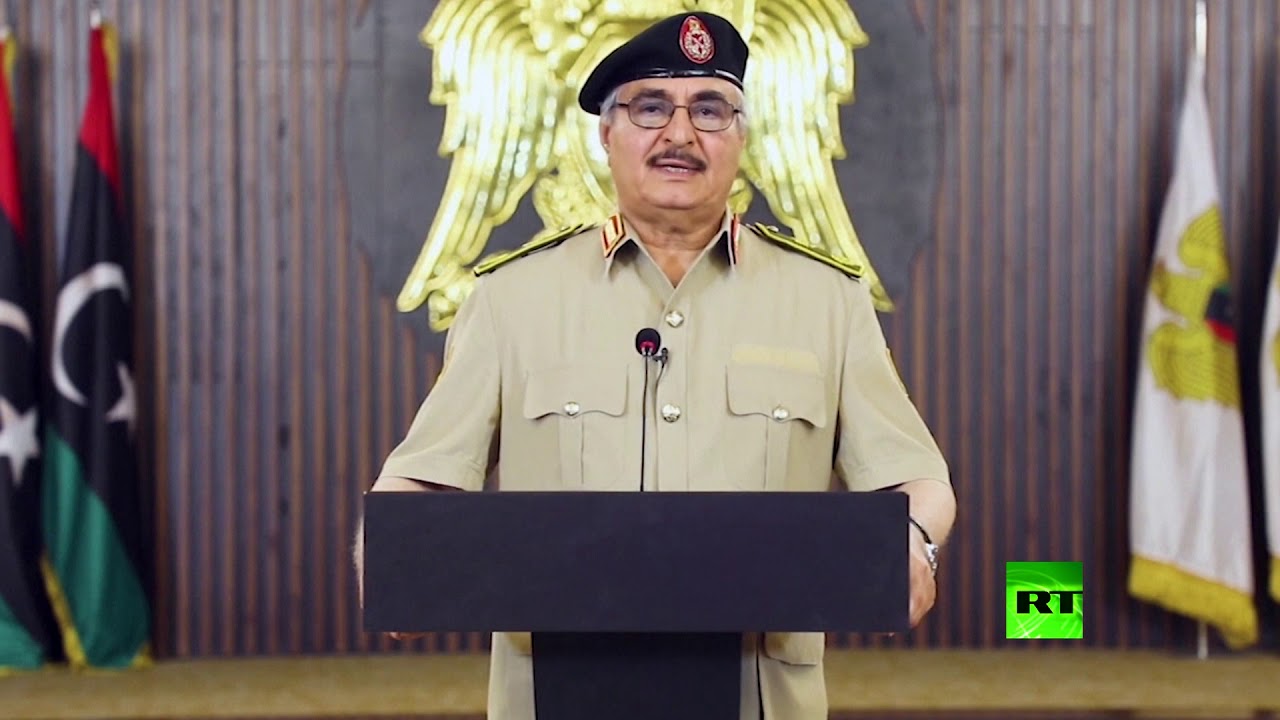LOC11:37
08:37 GMT
 Libyan National Army (LNA) leader General Khalifa Haftar announces "liberating Tripoli” operation
Libyan National Army (LNA) leader General Khalifa Haftar announces "liberating Tripoli” operation
KUWAIT, Dec 29 (KUNA) -- The crisis in Libya worsened in 2019 with leader of the Libyan National Army (LNA) General Khalifa Haftar launching an assault on the internationally-recognized Government of National Accord (GNA) of Fayez Al-Sarraj.
Following are major events in Libya this year.
April 4: Leader of LNA General Haftar announced his forces are moving towards the capital Tripoli in an operation he called "liberating Tripoli."
April 4: The UN-backed Libyan government led by Fayez Al-Sarraj, announced a state of national emergency, closing all crossings leading to the capital Tripoli, in an attempt to block the march of General Haftar's forces.
April 6: The UN and the G7 condemned resuming fighting in Libya and called for an immediate halt to all military operations.
April 7: The US military command and other international forces started evacuating their employees and militants from Libya, due to the deteriorating security conditions and the march of General Haftar's forces towards the capital Tripoli.
April 14: General Haftar arrived in Cairo to discuss the recent developments in Libya with Egyptian President Abdulfatah Al-Sisi.
May 8: France called for a cease fire in Libya between Haftar's forces and forces of Al-Sarraj.
May 21: Special Representative of the Secretary-General and Head of Mission in Libya Ghassan Salame called for immediate actions to prevent weapons from reaching the conflict parties in Libya. He warned that Libya will be pulled into a long bloody war.
July 1: General Haftar's forces released six Turkish nationals that they were holding prisoner in east Libya. Turkey had announced that they were arrested on 30 June.
July 3: At least 44 people were killed in an air raid on Tajoura refugee detention center in Tripoli.
July 4: The US thwarted UN Security Council condemnation of attack on Libya's Tajoura refugee detention center in Tripoli.
July 14: The UN called for the closure of migrants detention centers in Libya for the lack of humanitarian accommodation.
Aug. 5: Up to 43 people were killed and tens others injured in an airstrike against a residential neighborhood in southern Libya.
Aug. 11: Three UN workers were killed and eight others injured in a car bomb in the eastern city of Benghazi.
Aug. 16: Sabha Airport, southern Libya, was reopened following its closure in January 2014 due to security reasons.
Oct. 5: GNA accused forces loyal to Haftar of targeting Misrata International Airport in the west of the country.
Nov. 4: Misrata airport's authorities announced a temporary closure of airspace because of airstrikes by forces of General Haftar.
Nov. 11: The UN said 1,093 people were killed and 5,752 others injured while more than 128,000 fled their homes between April and July due to military confrontations between Haftar's forces and the troops of GNA.
Nov. 16: Seven foreign workers and two Libyans were killed, and over 35 others wounded in an airstrike by Haftar's forces on a factory southern Tripoli.
Nov. 17: The Libyan-US human rights organization filed a law suit against Haftar at an American court, accusing the General, who holds the US citizenship, of committing terrorist acts and violating international law.
Nov. 17: The internationally-recognized GNA refused to hand over Saif Al-Islam Ghaddafi to the International Criminal Court and said he would face trial in Libya.
Nov. 19: GNA said 13 people were injured in an attack launched by Haftar's forces on Misrata.
Nov. 26: A US delegation met with Haftar in yet another bid to stop his military offensive on Tripoli.
Nov. 27: US Assistant Secretary of State for Near Eastern Affairs David Schenker said Haftar's forces were controlling 80 percent of Libyan territories.
Nov. 27: Haftar's Libyan National Army said it regained control over Al-Feel oil field, southwest of the country.
Nov. 27: GNA head Fayez Al-Sarraj signed two MoUs with Turkey over military and security cooperation, and over maritime borders.
Nov. 28: Egypt, Greece and Cyprus rejected the MoUS.
Dec. 3: UN Security Council urged warring parties to immediately cease military hostilities and abide by the ceasefire.
Dec. 4: President of the Libyan interim government Abdullah Theni considered the security agreement with Turkey as legally void, and would have dangerous consequences once implemented.
Dec. 6: Greek foreign ministry told Libyan Ambassador in Athens Mohammad Yunus he must leave the country in 72 hours in protest of the agreement with Turkey.
Dec. 7: Turkish President Recep Tayyip Erdogan he said he would submit maritime border demarcation agreement with Libya to the UN.
Dec. 7: Haftar forces announced one their planes and arrest of its pilot by GNA troops.
Dec. 8: GNA said it thwarted an attack by multi-national forces loyal to Haftar to enter Tripoli.
Dec. 10: Greece filed a complaint with the UN over the maritime borders' agreement.
Dec. 12: Greece recognized Libyan parliament as the sole legitimate representative of the Libyan people.
Dec. 14: The UN said countries and companies violated the arms embargo against Libya, in place since 2011, by arming fighters on both sides of the conflict.
Dec. 14: Haftar forces destroyed a hanger of Turkish drones in Misrata.
Dec. 15: The Libyan Embassy in Cairo closed for security reasons.
Dec. 18: Egypt sent an urgent message to UN Security Council, voicing rejection of the Libyan-Turkish agreement to demarcate maritime borders and security cooperation.
Dec. 18: GNA forces engaged with LNA troops in southern Tripoli.
Dec. 20: Coalition government called on the US, the UK, Italy, Turkey and Algeria to activate security protocols to protect Tripoli from the current assault launched by forces of Khalifa Haftar.
Dec. 21: Turkish parliament approved security and military deal with Tripoli government in an effort to legally enable troops from Turkey to operate in Libya. (end)
eng